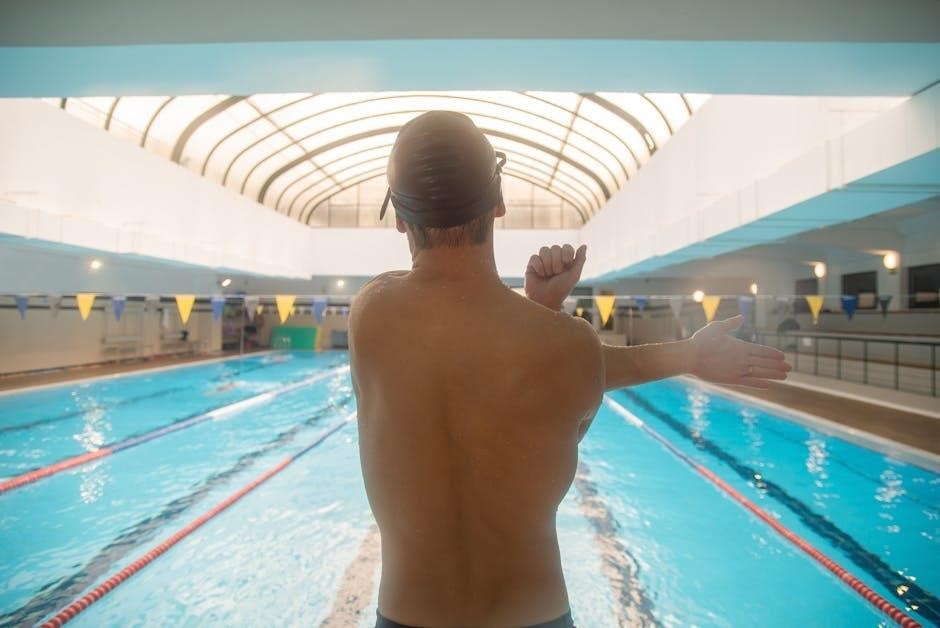A bikini competition prep guide is a comprehensive resource designed to help aspiring competitors prepare for their first or subsequent bikini competitions, covering training, nutrition, and mental preparation.
1.1 Understanding the Basics of Bikini Competitions
Bikini competitions are a popular category in female bodybuilding, focusing on aesthetics, symmetry, and stage presence. Competitors are judged on their physique, posing, and confidence. The bikini division emphasizes a balanced, toned body with curves, unlike the more muscular physique categories. Preparing for a bikini competition involves understanding the rules, categories, and judging criteria. It requires dedication to structured training, nutrition, and practice. Competitors typically start with a pre-prep phase to build muscle and reduce body fat before fine-tuning their physiques for the stage.
1.2 Importance of a Structured Prep Guide
A structured prep guide is essential for achieving success in bikini competitions. It provides a clear roadmap, ensuring no steps are missed in training, nutrition, or recovery. A well-organized plan helps competitors stay focused, track progress, and maintain consistency. Without a guide, it’s easy to lose direction, leading to suboptimal results. A structured approach also allows for personalized adjustments, ensuring the plan aligns with individual goals and needs. This organized method builds confidence and accountability, crucial for overcoming the challenges of competition preparation.

Setting Realistic Goals for Your Bikini Competition
Setting realistic goals for your bikini competition is crucial for success. It helps create a clear path, ensures accountability, and aligns with your timeline and fitness level.
2.1 Assessing Your Current Fitness Level
Assessing your current fitness level is essential to create a tailored prep plan. Start by evaluating your body fat percentage, muscle mass, and overall strength. Track your workout performance, including the weights you lift and the cardio intensity you can handle. Use progress photos and measurements to monitor visual changes. Understanding your starting point helps set realistic goals and ensures a safe, effective journey toward competition readiness. Regularly reassessing your fitness level allows for adjustments to your training and nutrition plan, keeping you on track to achieve your desired physique. This step is crucial for long-term success in your bikini competition prep journey.
2.2 Defining Short-Term and Long-Term Objectives
Defining clear short-term and long-term objectives is crucial for a successful bikini competition prep. Short-term goals might include weekly workout targets, progressive overload, and nutrition adjustments. Long-term goals focus on achieving a specific physique, such as lean muscle growth or fat loss, by competition day. Regularly assessing progress ensures accountability and helps refine strategies. Setting realistic milestones keeps motivation high and ensures steady progress toward your ultimate goal of stepping confidently on stage. This structured approach maximizes efficiency and maintains focus throughout the preparation journey. A well-defined plan is key to achieving success in your bikini competition.
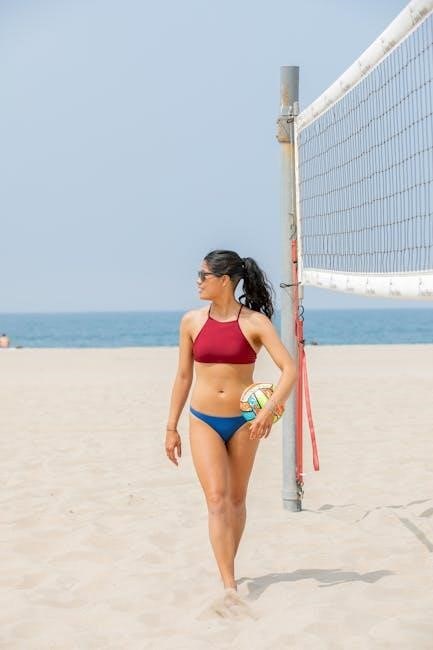
Training Guide for Bikini Competitors
A structured training plan is essential for bikini competitors, focusing on weight training, cardio, and progressive overload to enhance muscle tone and overall physique for competition.
3.1 Overview of Workout Types (Weight Training, Cardio, etc.)
A well-rounded training program for bikini competitors typically includes weight training to build and maintain muscle tone, cardio for fat loss, and flexibility exercises. Weight training focuses on compound movements like squats and deadlifts, while cardio such as HIIT or steady-state sessions enhances fat burning. The program also incorporates progressive overload to challenge muscles and promote growth. A structured 12-week plan, as seen in guides by experts like Traisha Martin, balances these elements, ensuring a lean, athletic physique. Equipment ranges from barbells to cables, catering to intermediate fitness levels.
3.2 Sample 12-Week Training Schedule
A typical 12-week bikini competition prep schedule includes structured phases: hypertrophy/strength (weeks 1-4), pre-peak (weeks 5-8), and peak week (weeks 9-12). Workouts focus on weight training (4-5 days) and cardio (3-4 days), with progressive overload. Example: Week 1-4: Full-body splits (legs, shoulders, arms, back, chest). Weeks 5-8: Increase intensity with supersets and HIIT. Weeks 9-12: Taper cardio, emphasizing posing and muscle definition. This plan ensures balanced development and peak condition by show day.
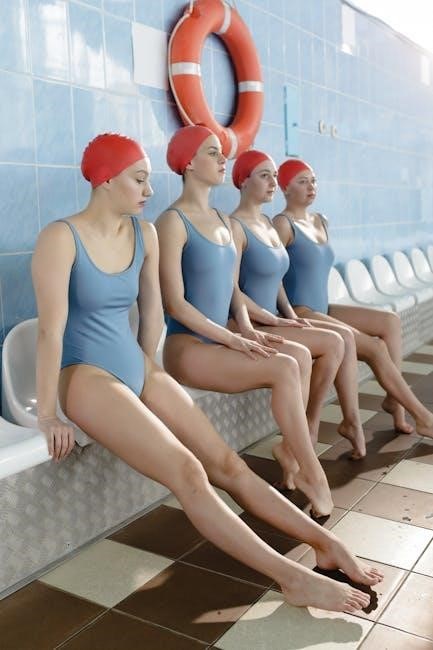
Nutrition and Diet Plan
A structured nutrition plan is crucial for bikini competition prep, focusing on macro-based dieting, meal prep strategies, and personalized approaches to ensure fat loss and muscle maintenance.
4.1 Macro-Based Dieting for Fat Loss and Muscle Maintenance
Macro-based dieting is a cornerstone of bikini competition prep, emphasizing precise balances of proteins, carbohydrates, and fats to promote fat loss while preserving muscle mass. By tailoring macronutrient ratios to individual needs, competitors achieve a lean, toned physique. This approach ensures sufficient protein for muscle repair, adequate carbs for energy, and healthy fats for hormonal balance. Regular adjustments based on progress and goals are essential to maintain consistency and avoid plateaus during the prep phase.
4.2 Meal Prep Strategies for Consistency
Meal prep is a vital component of bikini competition prep, ensuring consistency in nutrition and adherence to dietary goals. By planning and preparing meals in advance, competitors avoid deviations from their diet. A structured meal prep plan involves setting a prep day, portioning meals into containers, and maintaining a balance of macronutrients. This approach simplifies tracking and ensures nutrient-dense meals are readily available. Incorporating healthy recipes and cooking in bulk saves time and supports fat loss while maintaining muscle. Consistency in meal prep is key to achieving a lean, competition-ready physique.

Posing and Stage Presence
Mastering posing techniques and exuding confidence on stage are crucial for a strong competition performance. Proper posing highlights physical assets, while stage presence captivates judges and audiences.
5.1 Mastering Posing Techniques
Mastering posing techniques is essential for accentuating your physique and making a strong impression on stage. Practice foundational poses like the “relaxed” and “front double bicep” to highlight muscle definition. Focus on proper posture, engagement of core muscles, and confident facial expressions. Regular practice in front of a mirror helps refine your stage presence. Coaches often provide personalized feedback to ensure poses complement your body structure. Consistency and dedication to perfecting these techniques will enhance your overall performance and leave a lasting impression on judges and audiences alike.
5.2 Tips for Confidence on Stage
Confidence on stage is key to standing out in a bikini competition. Cultivate a positive mindset by embracing your hard work and dedication. Practice visualization techniques to imagine success, and focus on your strengths rather than flaws. Work with a coach to refine your stage presence and learn how to own the spotlight. Surround yourself with supportive individuals who encourage your journey. Remember, confidence is not just about physical appearance but also about believing in your worth and the effort you’ve invested. Own your moment and let your personality shine through!
Importance of Rest and Recovery
Rest and recovery are crucial for physical and mental health during bikini competition prep. Adequate sleep and downtime support muscle repair, growth, and overall performance.
6;1 Role of Sleep in Muscle Recovery
Sleep is essential for muscle recovery, as it allows the body to repair and rebuild muscle tissue. During REM and deep sleep stages, hormones like testosterone and growth hormone are released, promoting muscle repair and growth. Aim for 7-9 hours of quality sleep nightly to support recovery. Poor sleep can lead to increased cortisol levels, muscle soreness, and decreased performance. Prioritize a consistent sleep schedule, create a relaxing bedtime routine, and optimize your sleep environment to enhance recovery and overall competition prep success.
6.2 Incorporating Active Recovery Techniques
Active recovery techniques, such as light cardio, stretching, and foam rolling, play a crucial role in muscle recovery and overall prep success. These low-intensity activities improve blood flow, reduce muscle soreness, and enhance flexibility without overtaxing the body. Techniques like yoga or swimming can also aid in mental relaxation and physical rejuvenation. Incorporating active recovery 1-2 times weekly helps maintain progress, prevents injury, and supports consistent training. Consistency in these practices ensures optimal recovery, allowing competitors to perform at their best during workouts and on stage.
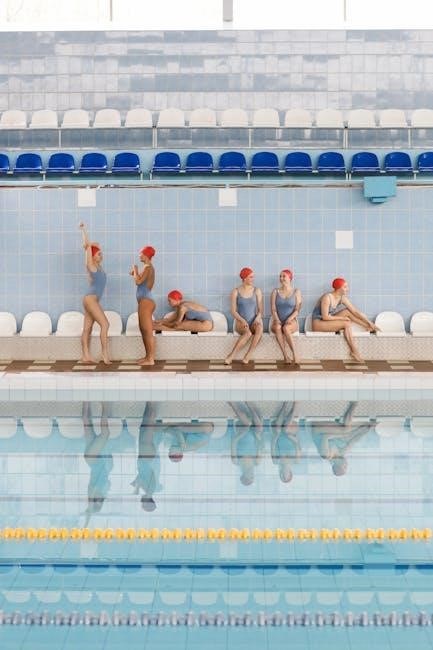
Budgeting for Competition Prep
Budgeting is crucial for bikini competition prep, covering expenses like coaching, gym memberships, posing classes, and stage attire. Planning helps manage costs effectively and avoid financial stress.
7.1 Estimating Costs (Coaching, Gym, etc.)
Budgeting for bikini competition prep involves estimating costs for coaching, gym memberships, posing classes, and stage attire. Coaching fees can range from $100 to $300 monthly, while gym memberships typically cost $50 to $150 per month. Posing classes and stage attire, such as suits and heels, can add another $200 to $500. Meal prep and supplements are additional expenses, averaging $100 to $200 weekly. Planning ahead and tracking expenses help competitors stay within budget and avoid financial stress during prep.
7.2 Tips for Saving Money During Prep
To save money during bikini competition prep, consider meal prepping at home instead of using expensive services. Opt for bulk supplement purchases and utilize coupons. Invest in multi-use stage items, like reversible suits, to reduce costs. DIY posing practice with online tutorials can minimize class expenses. Negotiate coaching packages or split sessions with fellow competitors. Plan ahead and shop for seasonal sales on gym gear and attire. Tracking expenses and setting a strict budget helps allocate funds wisely, ensuring financial stability throughout your prep journey.
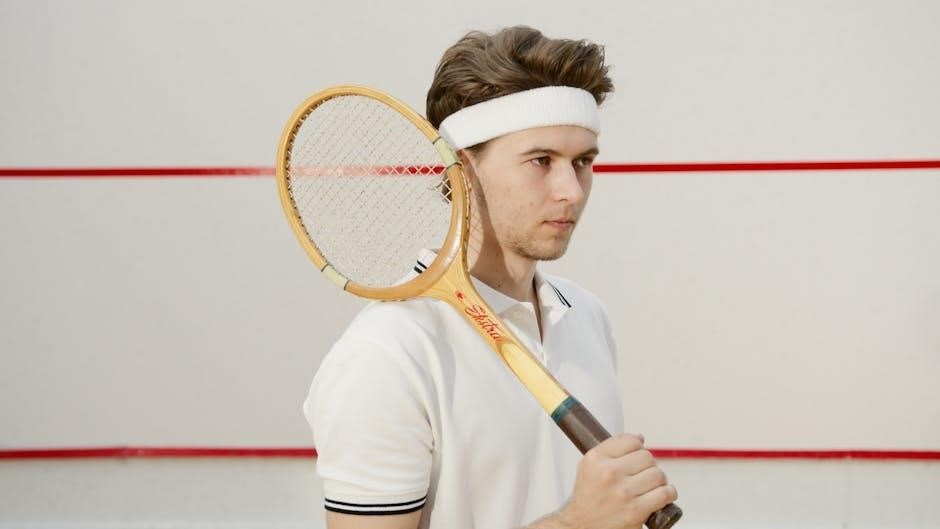
Final Preparations for Competition Day
Ensure all essentials like heels, suits, jewelry, and makeup are packed. Book your competition tan and confirm scheduling. Review posing routines and stay mentally prepared for a flawless performance.
8.1 Last-Minute Adjustments to Diet and Training
Final tweaks to diet and training are crucial for peak condition. Reduce water intake and sodium 48-72 hours before the show to enhance vascularity and definition. Adjust cardio duration and intensity to avoid muscle loss. Ensure meals are clean and portion-controlled, focusing on lean proteins and complex carbs. Avoid drastic changes to prevent dehydration or fatigue. Fine-tune your training with light sessions to maintain muscle fullness without overexertion. Rest and recovery become paramount to ensure you step on stage feeling confident and prepared.
8.2 Essential Items to Bring to the Competition
Pack a competition-day survival kit with your bikini suit, heels, jewelry, and stage-ready makeup. Bring hair styling tools, a sewing kit for suit adjustments, and a backup outfit. Include a tan touch-up kit, baby oil for shine, and a small towel. Don’t forget snacks, water, and a cooler for meals. A backstage kit with bobby pins, deodorant, and tissues is essential. Lastly, bring a copy of your registration, ID, and a small bag for personal items. Organization and preparedness ensure a stress-free experience;
Completing a bikini competition prep journey is a transformative experience, fostering mental strength and self-discovery. Embrace the process and view it as just the beginning of your fitness journey.
9.1 Staying Motivated and Focused
9.2 Embracing the Journey Beyond the Competition
Embracing the journey beyond the competition means recognizing the personal growth and resilience developed during prep; The skills learned, such as discipline, nutrition, and mental fortitude, translate into a healthier lifestyle. Celebrate the transformation and confidence gained, as these benefits extend far beyond the stage. The journey is about more than the competition itself—it’s about self-improvement, empowerment, and adopting a mindset that fosters long-term success and well-being.
